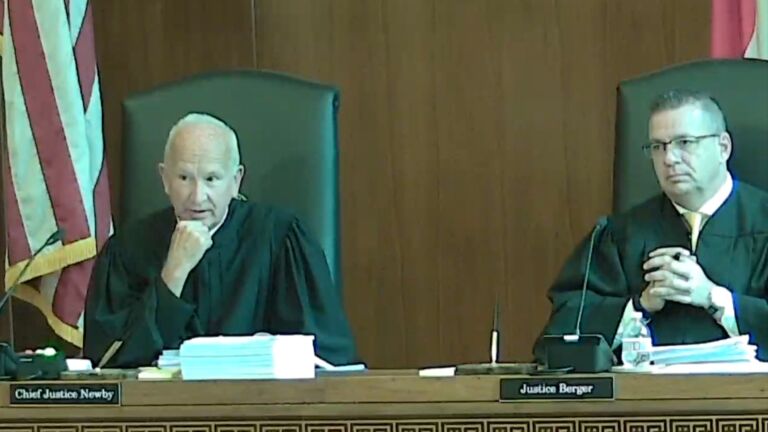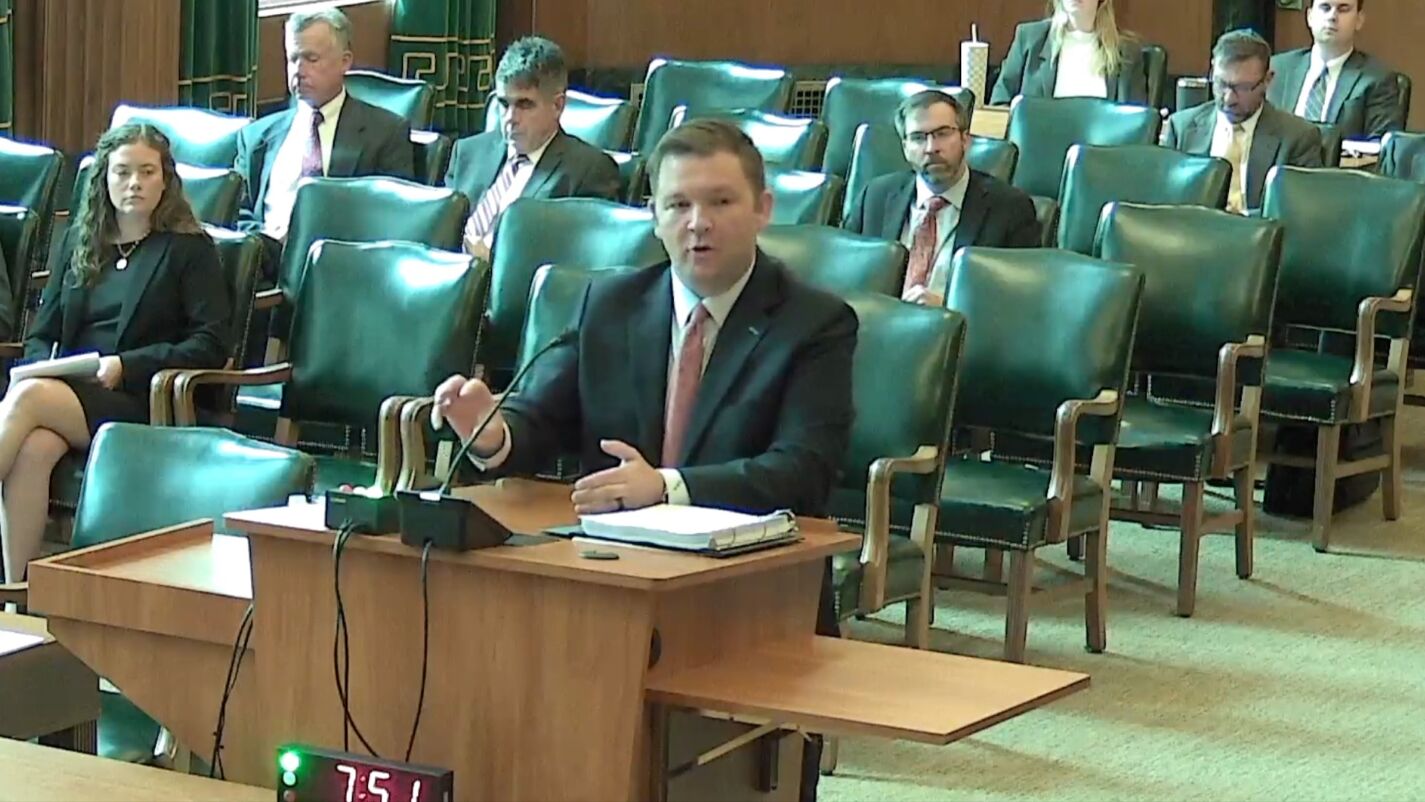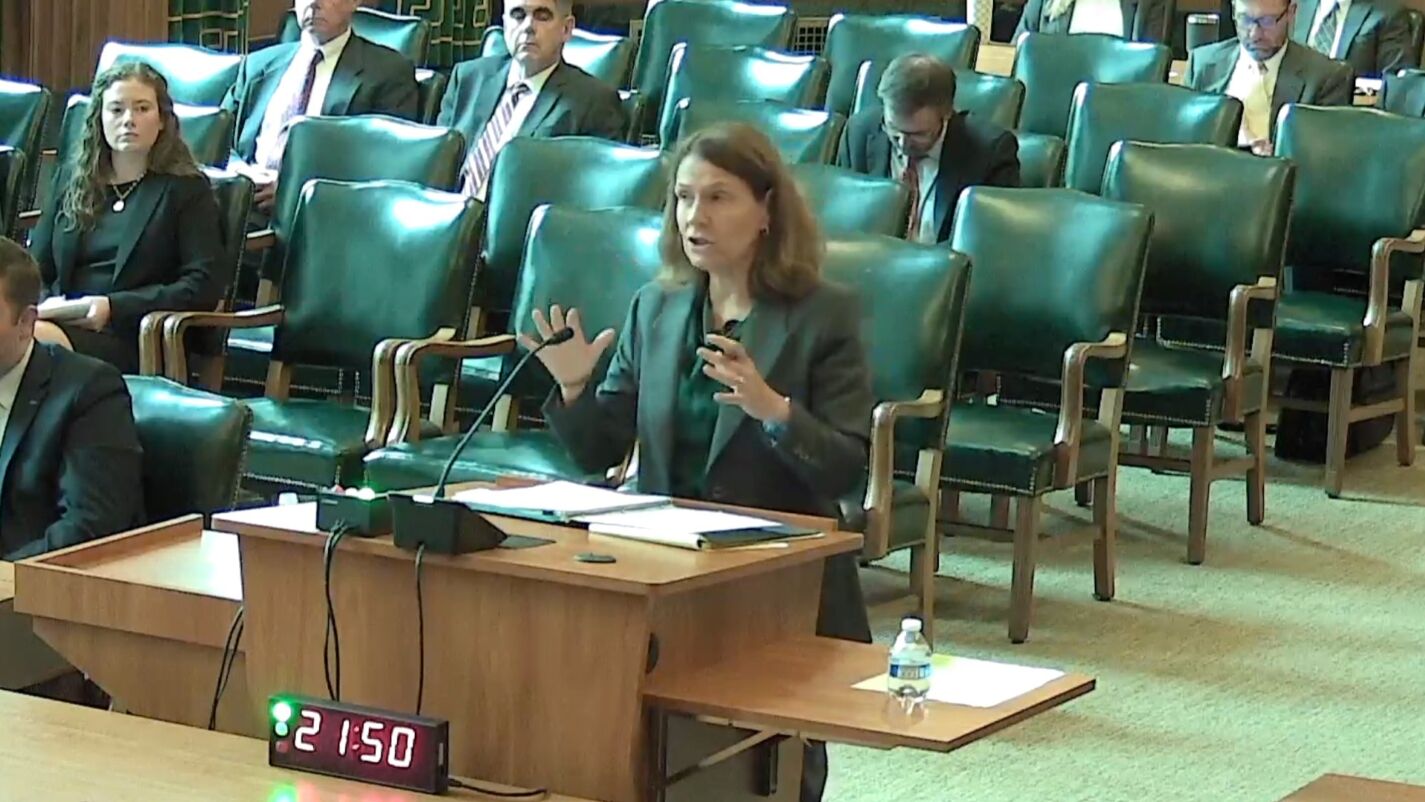Parents’ battle with Charlotte private school reaches top NC court

North Carolina’s highest court will decide in the months ahead whether parents can proceed with a lawsuit against the Charlotte private school that expelled their two children in 2021. It’s a case that has attracted attention from two Republican members of Congress and 11 GOP state legislators.
Lawyers for Doug and Nicole Turpin and Chalotte Latin School spent an hour Wednesday morning arguing before the North Carolina Supreme Court.
The Turpins have alleged breach of contract, unfair and deceptive trade practices, and defamation against the school and its leaders. Charlotte Latin responded that it followed provisions of its contract with the Turpin family.
A trial judge dismissed the case, and the state Court of Appeals split, 2-1, in upholding that decision in April 2024.
The parents urge the high court to allow them to move the lawsuit forward.
“It tells a story about Charlotte Latin School inviting them to take part in a conversation about the school’s culture and curriculum and then turning and expelling their children when Doug took that invitation up and presented problems with his child’s sixth-grade class to the school’s headmaster,” argued lawyer Chris Edwards.

Edwards labeled the expulsion of the two Turpin children a “rug-pull situation.”
“Here, Latin made a binding promise to educate the Turpins’ children, and it violated that promise when it expelled them,” Edwards said.
Charlotte Latin’s lawyer reminded Supreme Court justices that a private school faces different legal standards than a public school.
“More than 100 years ago, this court recognized that sometimes a private school just needs to separate from people who refuse to adhere to its policies,” argued lawyer Jennifer Van Zant.

“The freedom to contract gives [private school parents] the protection they need,” Van Zant added. “Applying unfair trade practices liability in this case — a contract dispute — does not promote transparency or accountability in private education. Rather, it would force judges into the business of regulating private schools.”
Private schools “would turn into vanilla, one-size-fits-all experiences that avoid offending everyone and end up pleasing no one” if they have to worry about increased liability for lawsuits, Van Zant warned. She predicted a “potential tort minefield.”
Much of the court’s discussion focused on whether the Turpins’ claims have a legal basis to survive a motion to dismiss the case.
Chief Justice Paul Newby’s questions signaled potential concern about the school’s actions.
“If we were to say this contract required good-faith, fair dealing, and there is in the contract a safe space for a parent to convey to school administration their concerns, and then — despite that — there is retaliation, why does that not get to an unfair or deceptive act?” Newby asked.
“My family believes this case is critical to the future of private school education,” Turpin said in a prepared statement provided to Carolina Journal. “Charlotte Latin and its allies in the private school associations arrogantly proclaim that schools should be immune from judicial review of their actions and conduct. They believe that the laws and rules that govern every other organization don’t apply to them.”
“If this precedent were to stand, it would mean they can expel any child at any time for any reason, regardless of what their contracts say or any promises or commitments they have made,” Turpin warned.
US Reps. Richard Hudson and Pat Harrigan, both Republicans, led the list of names on an amicus, or friend-of-the-court, brief filed in May supporting the Turpins.
“When private schools unfairly retaliate against students and their parents, can the schools be held accountable?” lawyer Troy Shelton asked in the friend-of-the-court brief. “That’s where Charlotte Latin broke its promises, smeared the Turpins in public, and expelled the children. If the decision below stands, it grants schools unfettered discretion to engage in such retaliatory conduct, undermining the foundational trust between families and schools in North Carolina.”
The brief from elected officials and interested groups focuses on two issues, Shelton wrote. “First, it examines the inherent unfairness faced by parents and students when private schools expel students under retaliatory or arbitrary circumstances,” he explained. “Second, it advocates for the application of N.C. Gen. Stat. § 75-1.1 — North Carolina’s unfair and deceptive practices statute — as a vital remedy for safeguarding the commercial relationship between private schools and the families they serve.”
“The Turpins’ ordeal exemplifies the vulnerability of families in private educational settings,” Shelton added. “After following the school’s prescribed channels for dialogue about curricular concerns, the Turpins were met with severe retaliation — their children were summarily expelled and the parents were defamed. The Court of Appeals’ decision absolved Latin from accountability for such conduct by dismissing claims at the pleading stage, before any factual development could occur.”
In addition to Hudson and Harrigan, the brief had support from state Sens. Brad Overcash, Dana Jones, Ted Alexander, and Amy Galey. State representatives also endorsed the brief: David Willis, Celeste Cairns, Grant Campbell, Brian Echevarria, Neal Jackson, Keith Kidwell, and Heather Rhyne.
Doug Turpin’s group Coalition for Liberty is listed as one of 12 organizations supporting the brief. Others are seven local chapters of Moms for Liberty, American Center for Education and Knowledge, Color Us United, Future Prep Educational Services, National School Boards Leadership Council, New Tolerance Campaign, Our Duty USA, Palm Beach Freedom Institute, Patriots Business Alliance, United Families International, and Advocates for Faith and Freedom.
“Doug and Nicole Turpin sent their children … to Charlotte Latin expecting them to flourish,” the family’s lawyers wrote in a brief filed April 24. “Instead, Latin expelled them — abruptly, without warning, and without process.”
“The reason? Doug spoke up,” the court filing continued. “He followed the school’s express invitation, and the process set out in its enrollment contract, to raise concerns and did so respectfully, urging a return to the school’s own stated values. For that, Latin severed its relationship with Doug and Nicole, blindsiding the family by expelling their children without warning at a meeting billed merely as a discussion.”
“This case asks whether a private school can invite open dialogue and then expel students in retaliation for their parents’ protected speech — while insisting its contracts grant it unlimited discretion to do so. The answer, under North Carolina law, must be no,” the Turpins’ lawyers argued.
The state Appeals Court’s April 2024 decision in the case marked the second time appellate judges had ruled against the Turpins. Unlike the first unanimous ruling in January 2024, the second decision split judges, 2-1, and produced three separate opinions.
The Turpins argued that the school violated its contract after the parents raised questions about changes in Charlotte Latin’s focus. The school responded that the Turpins violated provisions of the school’s “parent-school partnership” with ongoing complaints about Charlotte Latin’s operations.
“On appeal, plaintiffs contend that they ‘sufficiently alleged a breach of contract, and the trial court was wrong to conclude otherwise’ because ‘the court ignored the agreement’s plain language and disregarded Latin’s obligation to apply those agreements in good faith.’ We disagree, because the plain and unambiguous language of the enrollment contracts — and pursuant to the enrollment contracts, the Parent-School Partnership — allowed Latin to terminate plaintiffs’ enrollment contracts at Latin’s discretion,” wrote Judge Carolyn Thompson for the court’s majority.
Judge John Arrowood supported Thompson’s majority opinion but wrote a concurrence.
“I agree that plaintiffs failed to sufficiently allege a breach of contract because the plain and unambiguous language in the enrollment contracts, which state that ‘the School reserves the right to discontinue enrollment if it concludes that the actions of a parent/guardian make such a relationship impossible or seriously interfere with the School’s mission[,]’ allowed the school to terminate plaintiffs’ 2021 enrollment contracts at its discretion,” Arrowood wrote. “Because I believe that allowing this case, in its current state, to advance further would severely undermine the fundamental right to freely contract in North Carolina, which is a bedrock principle of North Carolina law, I write separately to highlight those concerns.”
“North Carolina ‘recognizes that, unless contrary to public policy or prohibited by statute, freedom of contract is a fundamental constitutional right,’” Arrowood explained. “Thus, absent such policies or prohibitive statutes, it is beyond question that parties can contract as they see fit and that courts must enforce those contracts as written to preserve that fundamental right.
“In my view, these enrollment contracts between a private school and those who wish to attend that school do not violate any public policy, statutory prohibitions, or protections,” the concurring opinion continued. “Therefore, this is a case of basic contract interpretation.”
Thompson and Arrowood are Democrats. Judge Julee Flood, a Republican, dissented from the ruling favoring Charlotte Latin.
“The line between the right to terminate a private contract and a contract breach is sometimes mercurial,” Flood wrote. “While the majority would draw that line at the point at which Plaintiffs were accused of certain behaviors in violation of provisions of their private school enrollment contracts, I conclude that the mandates of a Rule 12(b)(6) review are such that we must decline to draw that line prematurely.”
Rule 12(b)(6) involves testing the legal sufficiency of a complaint.
“Treating the allegations in Plaintiffs’ Complaint as true, and viewing the facts in the light most favorable to Plaintiffs, Plaintiffs made such allegations that they sufficiently stated a claim for breach of contract,” Flood wrote.
“Although the majority assesses Plaintiffs’ conduct as making impossible a ‘positive, collaborative working relationship between the School[,]’ or alternatively, as ‘seriously interfer[ing] with the School’s mission[,]’ such that Defendants were justified in their termination of Plaintiffs’ enrollment contracts, I conclude that this determination is premature as it necessarily involves findings of fact,” the dissent added.
“It is not within our appellate purview to determine at this stage in the proceeding whether Defendants were justified in their termination of Plaintiffs’ enrollment contracts,” Flood wrote.
“Parents’ battle with Charlotte private school reaches top NC court” was originally published on www.carolinajournal.com.










